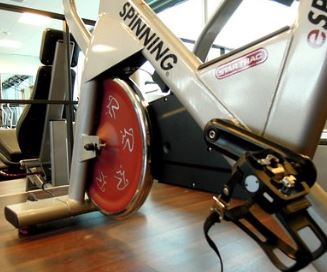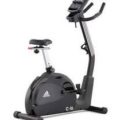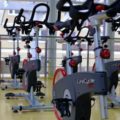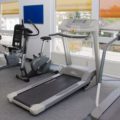If you need some help or tips with setting up your Exercise bike, then make sure to take a quick look at the videos provided below which will help you get them set up properly and efficiently in a shorter period of time.
Video - How to set up an Exercise Bike
How to Set up your Exercise Bike
Setting up an exercise bike properly is crucial for achieving maximum results from your workout and here are some tips to help you set up your exercise bike to get the maximum results while having comfort at the same time.
Adjust the Seat Height
The seat height should be adjusted to allow for a full leg extension when pedalling. You should be able to sit on the seat with your feet flat on the pedals, and your knees should be slightly bent at the bottom of each pedal stroke.
View also: Best Exercise Bikes here
Adjust the Handlebar Height
The handlebars should be adjusted to a comfortable height. If they are too low, it can cause strain on your back and shoulders. If they are too high, it can cause discomfort in your neck and upper back. Adjust the handlebars to a height that allows you to sit comfortably and maintain good posture throughout your workout.
Adjust the Seat Position
The seat position should be adjusted to ensure that you are sitting in the correct position on the bike. The seat should be adjusted forward or backward to allow for a comfortable and efficient pedalling motion.
Adjust the Resistance
The resistance on the bike should be adjusted to provide an appropriate level of challenge for your fitness level. If the resistance is too low, you may not be getting a sufficient workout. If it's too high, you may risk injury or burnout.
Warm-up
Before starting your workout, it's essential to do a warm-up. Start with low resistance and pedalling for a few minutes to warm up your muscles gradually.
Monitor Your Heart Rate
Monitoring your heart rate during your workout can help you get the maximum results. Most exercise bikes come with a heart rate monitor, or you can use a separate heart rate monitor to track your heart rate. Aim for a target heart rate that is appropriate for your age and fitness level.
Stretch
After your workout, take a few minutes to stretch your muscles. Stretching can help prevent soreness and injury and increase flexibility and remember to listen to your body and adjust your workout as needed to avoid injury and fatigue.
View also: Recommended Exercise Bikes here
Video - How to set up an Indoor Bike
How to Choose the Correct Flywheel Weight
When choosing an exercise bike, the flywheel weight is an important factor to consider. The flywheel is a weighted wheel that spins when you pedal, and it plays a critical role in the performance and feel of the bike and here are some factors to consider when choosing the correct flywheel weight for your exercise bike
Fitness Level
Your fitness level plays a crucial role in determining the appropriate flywheel weight. If you're a beginner or have low fitness levels, a lighter flywheel (around 3-5 kg) may be more suitable for you. It will be easier to pedal and less strenuous on your muscles. On the other hand, if you're an experienced cyclist or have high fitness levels, you may need a heavier flywheel (around 8-10 kg or more) to provide the right amount of resistance and challenge.
Type of Workout
The type of workout you plan to do on the exercise bike also affects the flywheel weight selection. If you're looking for a cardio workout with high-intensity intervals, a heavier flywheel may be more suitable as it provides more resistance for challenging workouts. However, if you're using the bike for recovery or a low-impact workout, a lighter flywheel will be more comfortable.
User Weight
Your body weight is another factor that influences the choice of flywheel weight. Generally, the heavier the user, the heavier the flywheel needs to be to provide a smooth and stable ride.
Brand and Model
Different brands and models of exercise bikes have different flywheel weights, and it's essential to choose the right one for your needs. Look for reputable brands and read reviews from other users to get an idea of the flywheel's quality and performance as it's essential to find the right balance between the resistance and the comfort level to achieve your fitness goals and get the most out of your workout.

Exercise Bike Training Frequency
Using an exercise bike can be an effective way to get fit and lose weight, but the frequency of your workouts is crucial for achieving your fitness goals so here are some factors to consider when determining how often you should use an exercise bike
Fitness Level
Your fitness level is the primary factor that determines how often you should use an exercise bike. If you're a beginner, it's recommended to start with two to three workouts per week and gradually increase the frequency as your fitness level improves. If you're an experienced cyclist or have a higher fitness level, you may need to increase the frequency to achieve your fitness goals.
Weight Loss Goals
If your goal is to lose weight, you may need to use an exercise bike more frequently. According to the American College of Sports Medicine, it's recommended to engage in at least 150 minutes of moderate-intensity aerobic exercise per week for weight loss. This can be achieved by using an exercise bike for 30-60 minutes per day, five days per week.
Time Availability
The frequency of your exercise bike workouts also depends on your time availability. If you have a busy schedule, try to incorporate shorter workouts throughout the day. For example, you can do a 15-20 minute workout in the morning and another in the evening to reach your weekly goal.
Recovery Time
It's essential to give your body time to recover between workouts to prevent injury and fatigue. If you're new to exercising or have a low fitness level, it's recommended to have a rest day in between workouts. As your fitness level improves, you can gradually increase the frequency.
Daily Use
To get fit and lose weight using an exercise bike, it's recommended to use it for 30-60 minutes per day, five days per week, and gradually increase the frequency as your fitness level improves. However, it's essential to listen to your body and give it time to recover between workouts to prevent injury and fatigue.
View also: List of popular Exercise Bikes here
Community Feedback
What are you own suggestions when it comes to setting an Exercise Bike properly? If possible, please share your own tips or opinions by leaving a comment in the comment box section provided below – so that others in the wider community can learn also







Recent Comments